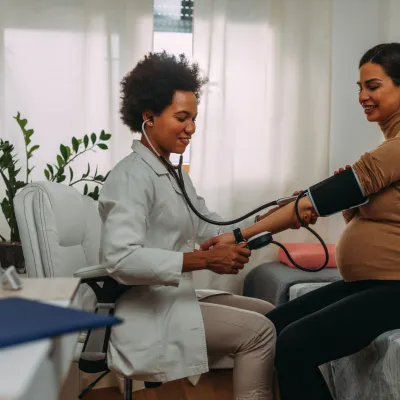- AdventHealth

Colon and rectal cancers are the fourth most common forms of cancer in the U.S., behind lung, breast and prostate cancer, affecting more than 140,000 Americans every year. These potentially life-threatening diseases are usually often referred to as colorectal cancer, but are sometimes called bowel cancer, as well. To learn more about these diseases, who’s at risk, and what can be done to prevent it, we spoke with Daniel Galante, DO, MS, a board-certified colorectal surgeon at AdventHealth Medical Group.
Symptoms of Colorectal Cancer
“You should be aware of changes in your stool, blood in your stool, unintentional weight loss and a sense of bloating or cramping that just doesn't resolve, when looking for signs of colorectal cancer,” explains Dr. Galante. “Unfortunately, many cancers don't show symptoms until they’re advanced, and that's why screening is so important.”
“Signs of inflammation of the colon include persistent diarrhea or mucus, bad lower abdominal cramps that don't go away, or blood mixed in with and coating your stool. You should never have blood in your stools. Sometimes it's just from hemorrhoids or irritation in the anal canal, but it may be related to something more serious. You should get checked out, regardless of the quality of the blood.”
“It’s important to note that bloating doesn't necessarily mean cancer, it’s just one symptom of colon cancer. If your bloating doesn't go away, you should speak with your doctor. And there’s no timeline for pain, but if you have relatively chronic abdominal pain, you should see your doctor. Pain doesn’t equal cancer, but it’s a signal your body is giving you to get checked out.”
Who’s at Risk?
“Screening for colorectal cancer should begin at age 45. The average age group of diagnosis is between 50 to 60, but we’re seeing an increase in younger patients, too. Patients of any age can develop colon cancer. The current American Cancer Society guidelines recommend starting screening at 45 years old for average risk adults.”
A family history of colorectal cancer elevates your risk of developing it. Family history includes family members who had colon or rectal cancer, inflammatory bowel disease and other polyp-related syndromes. A polyp is an abnormal growth of tissue in the colon that can lead to cancer. Of special concern are those family members who developed colon or rectal cancer early in life.
African Americans have an increased risk of colon cancer, and men have a slightly higher risk than women. Additionally, patients with inflammatory bowel diseases like ulcerative colitis and Crohn's Disease are also at an increased risk.
Colorectal Cancer Prevention
“The number one way to avoid colon cancer is to get screened,” says Dr. Galante. “Healthy lifestyle habits like diet, exercise, and avoiding alcohol and tobacco are all great ways to stay healthy, but screening is the most important and has the greatest impact. There are links between alcohol and tobacco with development of cancer and you should speak with your doctor about risk-reduction strategies and try to quit smoking. All healthy lifestyle habits act as risk reduction but can’t definitively prevent cancer.”
Studies have shown a direct correlation between a Western diet consisting of large amounts of red meat and fats with low amounts of fiber and to colorectal cancer. You should try to eat a variety of fresh fruits and vegetables, whole grains and other food rich in fiber, vitamins and minerals, as well as maintaining an exercise regimen of 30 minutes a day.
Treatment for Colorectal Cancer
“The five-year survival rate for colon and rectal cancer is about 66% and catching it early through screening is the best way to beat it,” says Dr. Galante. “The primary treatment for colon cancer is surgery and chemotherapy is only used for advanced colon cancer.”
For early stage cancers, surgery is used to remove any polyps that are found during your colonoscopy. Occasionally a laparoscopy is required for larger polyps that can’t be removed during the coloscopy.
For advanced cases, there are many different approaches available to patients including chemotherapy, radiation therapy, immunotherapy and targeted drug therapy.
Get Screened
If you’re concerned about your symptoms or would like to schedule your screening, we’re here to support you. For more information or to make an appointment with a specialist, please visit our site or call Call407-200-2700.



